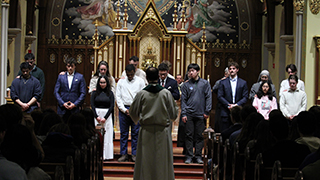Approval of Modified Seeds of Innovation Proposal
Tuesday, September 28, 2021
Dear University Community,
I am writing to update you on the Seeds of Innovation restructuring proposal, which was modified over the summer to incorporate your feedback and approved by the Board of Regents last Friday, September 24, 2021.
A Reflective and Thorough Process
As reported earlier to you, an ad hoc committee was formed in September 2020 to review Seton Hall's academic structure in accordance with Harvest Our Treasures, our strategic plan. Specifically, Goal 5.6 of the plan directs us to:
“review the size, distribution and configuration of colleges, administration and academic and non-academic departments to ensure maximum effectiveness and the highest and best uses of resources.”
The ad hoc committee — which was duly constituted in support of shared governance, and which included representation from the Faculty Senate — studied benchmarking data from Seton Hall and other universities. Following Faculty Guide section 12.5.c, the Senate sought nominations and nominated twice the number of faculty members for service on the University Structure Committee. The Provost's Office selected three highly qualified faculty to serve, including the chair of the Faculty Senate.
Committee members thoughtfully examined multiple restructuring possibilities and diligently worked to create a holistic plan for transformation. As it was charged, the committee continually sought to maximize reinvestment in the Academy and advance Seton Hall's academic vision through a distinct, compelling and competitive portfolio.
In April 2021, we presented the initial draft Seeds of Innovation proposal to the University community as a starting point for comment and feedback. We met with affected schools and colleges, and all other academic units, held campus-wide forums and hosted question-and-answer sessions to address concerns.
My office received helpful feedback throughout this portion of the process, which was further extended through June 30 at the request of the Faculty Senate. By soliciting feedback and comments for more than 70 days and holding over 70 meetings and office hours, the ad hoc committee and the Provost's Office not only listened to — but acted on — the input they received. The committee and I then produced a modified Seeds of Innovation proposal that included many of your suggestions.
The modified proposal and feedback were reviewed in great depth by the Academic Affairs Committee of the Board of Regents. The committee also heard from Mary Balkun, Ph.D., new chair of the Faculty Senate. Additionally, at the recommendation of the Academic Affairs Committee, the entire Board of Regents received a full briefing from the Provost and was provided access to all community feedback. After thoroughly reviewing the full complement of materials, the Board of Regents approved the modified Seeds of Innovation proposal.
I am grateful for the Regents' support and approval. As fiduciaries and officers of the University, Regents are responsible for ensuring Seton Hall's long-term financial viability and service to its Catholic educational mission. Seeds of Innovation will accomplish that by reducing administrative overhead, increasing the percentage of budget spent on instruction, and reinvesting in new academic programs and initiatives that are sustainable and innovative.
Summary of Approved Academic Restructure
Below is a summary of the modified Seeds of Innovation proposal that was approved by the Board. You will note where the Office of the Provost incorporated feedback it received — particularly as it pertains to demonstrated evidence of potential success and fiscal responsibility.
- The College of Arts and Sciences (CAS) neither endorsed nor rejected the initial proposal.
Rather, it requested more time to deliberate with its new dean on a long-term organization
that will best support its processes. The Office of the Provost is prepared to provide
the associate dean lines necessary to support the multifaceted college's operation;
among all of the University's schools and colleges, CAS continues to have the highest
complexity but the lowest ratio of administrative support compared to the number of
faculty and students.
- The initial proposal merged the College of Nursing (CON) and the SHMS into an expanded
and integrated College of Nursing and Health Sciences. CON requested more time to
improve its financial performance as an alternative to a merger.
Given the excellent performance of CON students on the National Council Licensure Examination (NCLEX) and enrollment growth this fall, CON is well-positioned to improve its fiscal performance, dependent on strong retention. Mindful of the college's current financial status, the Board granted CON two years to close its budget gap, increase fundraising, align enrollment with national trends and achieve necessary grant funding to support doctoral education. The 2021U.S. News & World Report rating of nursing education, which placed the CON undergraduate program in the top 10 percent of ranked programs, will benefit these efforts.
If the Provost-assigned targets are not achieved within two years (Academic Years 2021-22 and 2022-23), the Regents have approved the automatic consolidation of CON and the School of Health and Medical Sciences to be implemented during Academic Year 2023-24.
- The School of Health and Medical Sciences (SHMS) was supportive of its integration
into a College of Nursing and Health Sciences, especially due to the possibility of
creating clinical (with professional expectations) and tenure-track (with research
expectations) lines for faculty who achieve outstanding outcomes in funded research,
scholarship and service.
SHMS' strong financial performance, academic and professional outcomes will enable the Provost's Office to work confidently with faculty on several initiatives, including the possibility of reinvesting surplus revenue into its quasi-endowment to permanently sustain reinvestment in instructional resources.
- The College of Education and Human Services (CEHS) and the College of Communication
and the Arts (COAR) provided a range of opinions supporting and opposing the initial
draft. To improve each college's fiscal performance, and to draw upon opportunities
for academic synergies identified through the benchmarking process, the Regents voted
to create a unified College of Education, Communication Arts and Human Development
(or similar name). The Provost's Office will redirect enhanced investments toward
this consolidated unit.
Under the leadership of their interim deans, and working with respective faculty members, both colleges will prepare to combine by fall 2023. Once integrated, the new college will be well-positioned to chart the future of education and communication for human development while expanding through collaborative programs within and across the University, and increasing the use, study and integration of emerging technologies in learning and communication.
- The School of Diplomacy and International Relations (DIPL) has consistently advanced
toward achieving ambitious targets by developing new initiatives and collaborating
with the School of Law in ways that are already showing positive outcomes through
numerous metrics. The outlook is promising, and the Provost's Office supports DIPL's
request to promptly implement a search for a permanent dean to better accomplish its
ambitious objectives.
- Most importantly, many stakeholders and units are already working on innovative proposals for program innovations through the experimental Academies, which the Provost's Office is pleased to fund through strategic reinvestments. We have already launched a call for innovative idea submission and will provide more information about these academic initiatives as they progress.
Throughout, we followed Faculty Guide section 11.4, which only applies to the internal organization of colleges/schools. With the Board's approval of Seeds of Innovation, the process for implementing internal organization will follow 11.4, and it will be a collaborative and iterative process with the faculty and their leadership.
A Note of Gratitude and Next Steps
Last week I shared the news that we are making a reinvestment in academics, consistent with Goal 2 of Harvest Our Treasures, which “focuses on supporting faculty by strengthening academic quality, research and scholarship, and enhancing equity and inclusion.” This involves significant faculty hiring, including new tenure-track lines, amounting to a new investment of half a million dollars. To continue to make such investments, it is critical that we examine our structures. By improving efficiencies and implementing changes we can make additional, similar strides in instructional initiatives and state-of-the-art spaces.
Change is difficult, but often necessary. With that in mind, I share my tremendous gratitude to the University Structure Committee for its selfless work, and for the dignity with which its members carried out their duties. My thanks also go to everyone in the Seton Hall community who offered their insight and commentary through the channels we established.
As you can see, the final version of Seeds of Innovation is markedly different than the initial draft. We earnestly listened to your candid feedback and thoroughly considered your concerns and your comments. I trust the final version demonstrates the commitment we all share to continued academic investment and improvement.
More work certainly lies ahead, but it is exciting work that was rightly called for as part of the strategic planning process. I look forward to advancing the University's academic vision with the essential goal of continued academic excellence, global recognition and the resulting innovation.
In her remarks at this year's convocation, Mary Balkun, Ph.D., chair of the Faculty Senate, correctly noted that Seton Hall is a family. She then asked: “What kind of family do we want to be?” I believe we must be a family that can work together — with our common love of Seton Hall at the core of everything we do. As one community and one University, we can achieve so much.
I ask that we all continue to pursue the sometimes-difficult tasks that are necessary to ensure the vitality and long-term sustainability of our academic home. I am confident we will, for our communal dedication to Seton Hall calls for it. We have an aspirational but achievable growth agenda to move the University forward, and, working together, we can continue to show the world “What Great Minds Can Do.”
All the best,
Katia
Categories: Education






